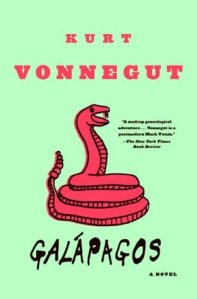Title: Galapagos
Author: Kurt Vonnegut
Genre: Classic/Science Fiction
Trigger Warnings: Suicidal ideation, suicide attempt, divorce, blood (mentions), cancer, murder, incest (mentions), child sexual abuse/pedophilia, whorephobia/slut-shaming
Note: Trigger warnings in DNF books only cover the part I read. There may be triggers further in the book that I did not encounter.
Read To: 63%
Back Cover:
Galápagos takes the reader back one million years, to A.D. 1986. A simple vacation cruise suddenly becomes an evolutionary journey. Thanks to an apocalypse, a small group of survivors stranded on the Galápagos Islands are about to become the progenitors of a brave, new, and totally different human race. In this inimitable novel, America’s master satirist looks at our world and shows us all that is sadly, madly awry—and all that is worth saving.
Review:
I actually got pretty far though this one. It was definitely weird, but very creative and for a while I was curious about what happened. But then it got repetitive.
This book has a main cast of characters, and what I’m calling “Plot A” for convenience is set in a hotel in Ecuador, narrated by an unnamed person who might be from the future or immortal or dead or all three – it’s up to you to put together the pieces about them. Many of the characters end up dead before the end, which the narrator makes sure to announce early on. Since the narrator is either way in the future or possibly outside of time, there is very little linear structure to the way the story is told. It flips though our main cast in Ecuador, their pasts, their futures, tangents about a few minor characters, and humanity a million years after the 1980s when Plot A is set.
And it actually kind of worked. It was weird jumping between Plot A in 1980s Ecuador during a global economic collapse, each of the characters’ pasts that brought them there, their futures (mainly who they had children with and how they died), and bits of how humanity functions a million years on. The narrator kept stressing that these people at the hotel – including a widow, a con man, a Japanese couple, a millionaire and his daughter, a ship’s captain whose rank was purely decorative, and six native Ecuadorian girls recently escaped from their pimp – were the ancestors of the entire human race, and I was very curious about what happened to the rest of the world.
And then nothing ever progressed. We got characters’ backstories, sure, and brief vignettes about their life after whatever was going to happen happened, little hints and mentions of what did happen and what humans evolved into a million years later. But mostly it was about the Big Important Point of the book – that human evolution has made human brains so big that they can do stupid and counterproductive things like lie, and invent deadly weapons, and cause economic collapse by stopping believing in the value of currency, and make you feel suicidal, and other such things that could get in the way of popping out babies to continue the species which is the entire point of everything.
On one hand, it’s both accurate and an interesting philosophical idea. Human brains can malfunction in many weird ways that harm our individual survival (I say this as an owner of a somewhat malfunctioning brain myself), we do believe in a lot of imaginary things like currency and gender roles, and reproduction is the entire goal of evolution. However, after a while the narrator harping on this idea got obnoxious. Every time anyone did anything that wasn’t strictly about survival or reproduction, the narrator would go on about how their big brain made them do it and aren’t we glad our brains evolved to be smaller in the future? It also focused a lot on reproductive activity and how exactly our main cast’s genes went on to become the new, smaller-brained version of humanity. Which got a little uncomfortable at times because the native Ecuadorian girls were all minors during Plot A.
It’s not a bad idea, really. I quite enjoyed it for a while. But eventually it got old and I got annoyed. I think this would have worked much better as a short story or a novella to cut out all the repetition that annoyed me. But in its current form, 63% is about all I care to read.

